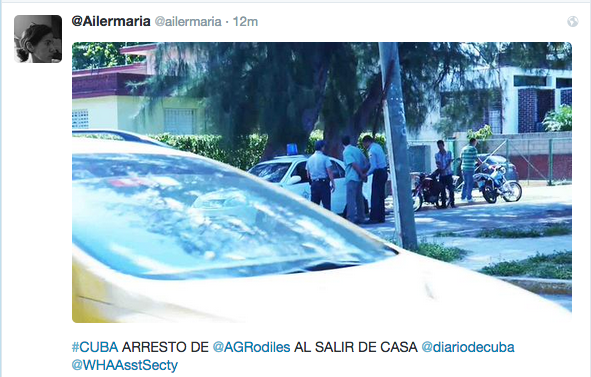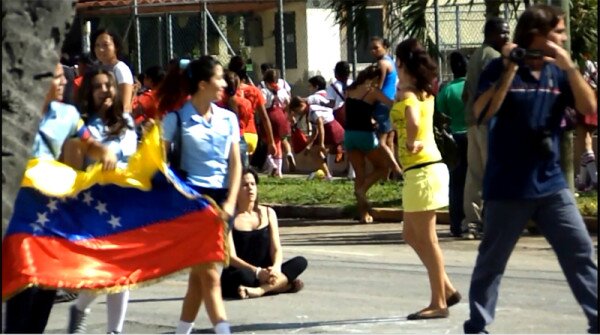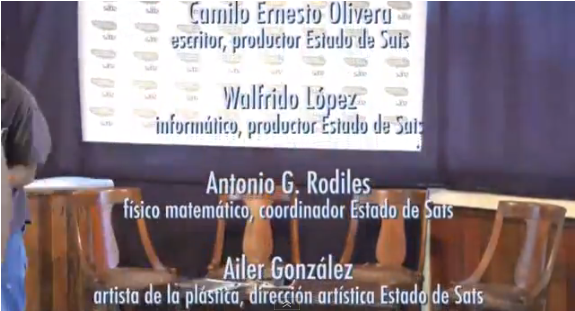
Category: Ailer Gonzalez
Angel Moya Arrested on Leaving His House in Havana / Ailer Gonzalez
Antonio Rodiles Arrested on Leaving His House in Havana / Ailer Gonzalez
The Harvest of the Sowing of Violence / Cubanet, Rafael Alcides

 Cubanet, Rafael Alcides, Havana, 13 May 2015 – Extremely worried, doctoral candidate in physics Antonio Rodiles and his wife the actress and political activist Ailer Gonzalez, in their home, related to me two events that I have prayed over, that those events that started with the blood of Moncada wouldn’t end up being a circular story. Ailer and Antonio spoke of the increased police repression after December 17, most particularly of the brutality with which the oppressors are being dispatched.
Cubanet, Rafael Alcides, Havana, 13 May 2015 – Extremely worried, doctoral candidate in physics Antonio Rodiles and his wife the actress and political activist Ailer Gonzalez, in their home, related to me two events that I have prayed over, that those events that started with the blood of Moncada wouldn’t end up being a circular story. Ailer and Antonio spoke of the increased police repression after December 17, most particularly of the brutality with which the oppressors are being dispatched.
On Sunday the 26th of last month, with their trucks crammed with martial arts experts at the end of the usual parade of the Ladies in White, Carlitos, the son of Jesus Menendez, an elderly diabetic with heart problems, was grabbed, dragged and thrown in the back of the truck like a sack of potatoes. Yury, Blas Roca’s grandson, was put in plastic handcuffs so tightly that his hands turned black and they didn’t cut them off. Up Calabazar, the truck with the prisoners inside was left in the sun to bake them a little. They grabbed Antonio among the many present and pushed him with blows to the back before throwing him headfirst into the truck. An endless number of books could be written about the mistreatment and repression of the Ladies in White, apparently excluded from government’s media campaign to end violence against women. continue reading
There has been no lack of repression since 1959. Nor cruelty. In the Canary Islands, during a tribute to the poet Manuel Díaz Martínez, Raúl Rivero talked to me about a blind dissident attorney on the outskirts of Ciego Avila who for a time took lottery bets from the area’s cops. They detained him and when night came they left him in the boondocks. The cop won a bet on what time the blind guy would be seen groping his way into the village using a stalk of sugar cane or a bare branch.
Amazed at not having seen him for a long time, at the Cuban Writers and Artists Union (UNEAC) I met the Galician Regueral, now in his 60s, a Spanish journalist who has lived in Cuba since the 40s. “I was imprisoned for a year in Villa Marista,” he told me. “Why?” “I asked them that when they let me go. ‘Get out of here you Galician, go! Go!’ was the response. They never interrogated me.”
But it couldn’t be pinned on the political police. Kidnapped, homes invaded at midnight and turned upside down, and struggling, taking down the opponent by force, but it can’t be pinned on them. Or not exposed. For this they use the supposed “outraged people,” a mob disguised by its sheer numbers.
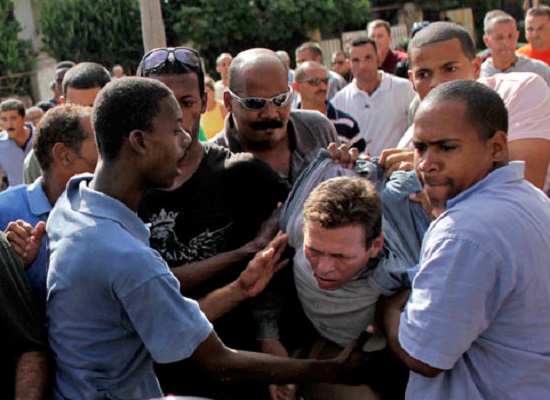
On the other hand, this is the least likely moment to make a show of brutality. They’re expecting investors in the Port of Mariel project (although those in the know say with so little bait they’re not going to catch big fish) There are also the American government authorities frequently visiting the Island, and behind them, or in front or them, are those who come to check out the part where they would like to stay, the government and entrepreneurs are expecting four million American tourists who speak of the myth. And in September Pope Francis will come. It is, I insist, the least likely moment to step up the heat.
After the first years of the Revolution, there were no more firecrackers going off, no place for sabotage, or attacks or an uprising to happen. Those methods of fighting, traditional on the Island in and those that in the 26th of July Movement were considered excellent, disappeared. The dissidence, in that regard, has been more peaceful than plaster saints. But violence often engenders violence.
I remember a boy from those times of Aguirre Park who didn’t want to get involved in anything. Seeing him appear, the group changed the subject. “Hush,” they said. It scared him. “I’m getting cold,” he complained. One night he came close to tears, but was determined. “Gentlemen, count me in on whatever,” he said. A cop whose girlfriend he’d offended had punched him. Then, from what I learned after 1959, he became the best at planting bombs.
A man without a job in dangerous, but a man with a policeman’s hand over him could be the beginning of civil war. I understand Army General Raul Castro. If he allows the demonstrations of the Ladies in White, he would have to allow others and all the rest, but if he doesn’t allow them, he will have to continue to use brutality and then he has crossed the line than can’t be crossed. He’s caught in a lose-lose situation. All that’s left is to open the game. Inaugurate democracy. His time has run out.
Mass in Cuba for Oswaldo Payá and Harold Cepero / Cubanet, Ignacio Gonzalez and Osmel Almaguer
 Cubanet, Ignacio Gonzalez and Osmel Almaguer, Havana, 13 May 2015 – A Mass for the deceased Oswaldo Payá Sardiñas, opposition leader, and Harold Cepero, activist, was held this afternoon at the Church of Los Pasionistas in Havana, with Rosa María Payá in attendance. Rosa María, daughter of the Cuban human rights activist and recipient of the European Union’s Andrei Sakharov Prize for Freedom of Thought, arrived from the Miami Airport to Cuba on the morning of May 11, to reunite with her family and friends and to honor the memory of her father.
Cubanet, Ignacio Gonzalez and Osmel Almaguer, Havana, 13 May 2015 – A Mass for the deceased Oswaldo Payá Sardiñas, opposition leader, and Harold Cepero, activist, was held this afternoon at the Church of Los Pasionistas in Havana, with Rosa María Payá in attendance. Rosa María, daughter of the Cuban human rights activist and recipient of the European Union’s Andrei Sakharov Prize for Freedom of Thought, arrived from the Miami Airport to Cuba on the morning of May 11, to reunite with her family and friends and to honor the memory of her father.
The Mass was attended by activists of the Estado de Sats project, Antonio Rodiles and Ailer González, and by Manuel Cuesta Morua, leader of Progressive Arc, among others.
The opponent Antonio Rodiles is not allowed to leave Cuba / Cubanet
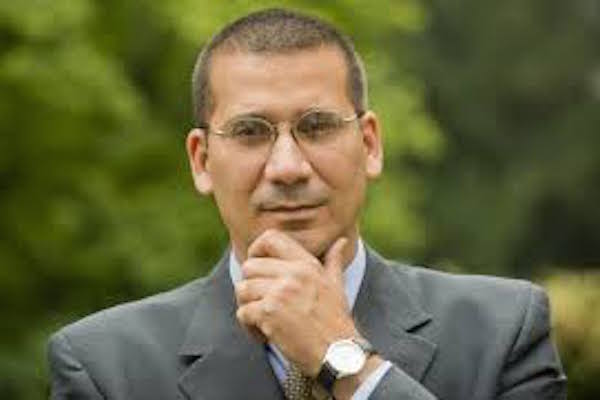 Cubanet, 13 January 2015 – The director of the opposition group Estado de SATS, Antonio G. Rodiles, reported Tuesday that the regime has refused to allow him to leave the country, as stated in his account on the social network Twitter.
Cubanet, 13 January 2015 – The director of the opposition group Estado de SATS, Antonio G. Rodiles, reported Tuesday that the regime has refused to allow him to leave the country, as stated in his account on the social network Twitter.
 The opponent was arrested the day of Tania Bruguera’s performance, with his wife, Ailer Gonzalez, whose passport was also withdrawn. Bruguera, currently in Havana, has also been denied permission to leave the country.
The opponent was arrested the day of Tania Bruguera’s performance, with his wife, Ailer Gonzalez, whose passport was also withdrawn. Bruguera, currently in Havana, has also been denied permission to leave the country.
Cubanet spoke with Rodiles by telephone. He told how he had gone to the office of the Ministry of the Interior where passports are processed to renew his passport (the Cuban passport is valid for six years, but must be “renewed” every two to maintain its “validity”) and the official attending him, after searching for his name on the computer, simply informed him that his passport could not be renewed and, consequently, he could not travel abroad “for reasons of public interest.”
Days earlier, during the arrests that Rodiles and his wife, the artist Ailer González, were subjected to during the performance that Bruguera attempted in the Plaza of the Revolution, one agent of the Ministry of Interior had told Gonzalez to hand over both passports, which she did not do.
It is significant is that, so far, Rodiles and Ailer González, who had no direct involvement in organizing Bruguera‘s performance, are the only opponents against whom the government has taken this step.
Tania Bruguera Under Arrest at Acosta Police Station in Diez de Octubre, Havana / 14ymedio
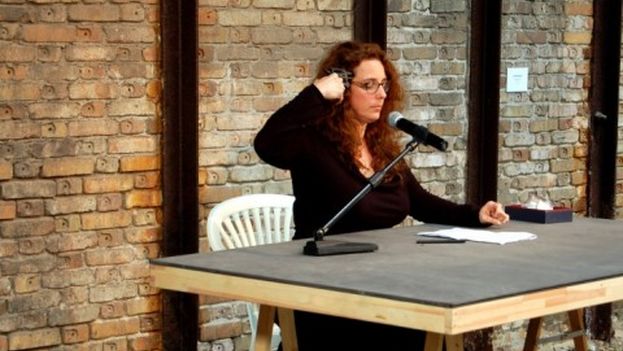
14ymedio, Havana, 30 december 2014 — Contacted by phone at her home, the director of 14ymedio, Yoani Sanchez, said that Tania Bruguera was under arrest at the Acosta Police Station in the Diez de Octubre municipality in Havana.
Reinaldo Escobar was released from the same station Tuesday night at 10:00 pm. Escobar affirmed that he saw Tania “wearing the gray uniform of a convict,” It is still unknown when Bruguera will be released.
The two police cars surrounding Yoani Sanchez’s building have been removed and the director of this digital daily is no longer under house arrest.
The 14ymedio reporter Victor Ariel Gonzalez is still being detained, in Guanabacoa. Still unknown are the whereabouts of the activists Antonio Rodiles, Ailer Gonzalez and Eliecer Avila, along with the photographer Claudio Fuentes and his partner, Eva Baquero.
Developing news.
UPDATE: Ailer Gonzalez has been released.
A Moment of Zen in the Midst of Chaos / Ailer Gonzalez [Video]
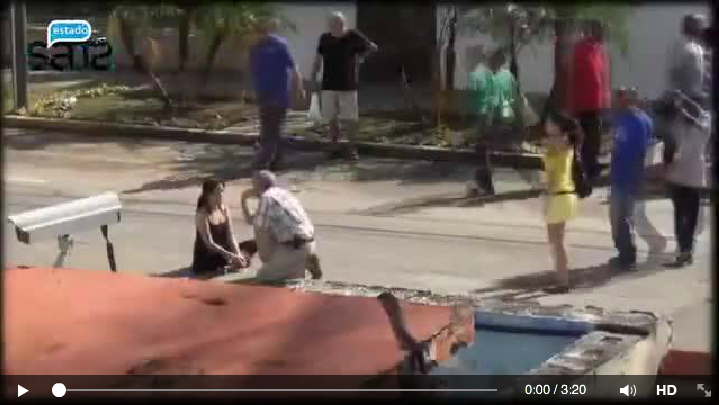
After the violent arrest of her husband, Antonio Rodiles, at the Human Rights Conference sponsored by Estado de Sats, Ailer Gonzalez chose a moment of non-violence in the midst of the madness. As children, still in their uniforms and taken out of school to spend the day harassing human rights advocates swirled around her, Ailer sat quietly under the Havana sun…
Note: At the beginning of the video in the bottom left Antonio’s mother (green dress and cane) can be seen walking back to the house after the arrest with one of the conference participants who then turns back to talk to Ailer. The other adults in video are primarily plainclothes State Security agents working for the Ministry of the Interior. The flag the children are waving (other than Cuba’s) is Venezuela’s.
Ailer Gonzalez Sitting in Protest / Lia Villares
Repression at Estado de SATS (Video)
This video was taken in the street outside the home of Antonio Rodiles, which is also the headquarters of Estado de SATS, where a Conference on Human Rights was being held in honor or World Human Rights Day.
The man in the blue shirt with glasses is Antonio Rodiles, director of Estado de SATS. The woman appearing next to him in a black dress early in the video, and sitting on the street later in the video, is Ailer Gonzalez, Antonio’s wife and also one of the active coordinators of Estado de SATS. The older woman in the long green dress holding a cane is Antonio’s mother.
The children (in and out of school uniform) were taken out of school to spend the day “repudiating” the Estado de Sats Human Rights Conference (a government spokesperson claimed they were having a “sports day” on this residential street and that Antonio was abusing the children when he was arrested).
Released! / Ailer Gonzalez
Antonio Rodiles Arrested With Extreme Violence / Estado de SATS
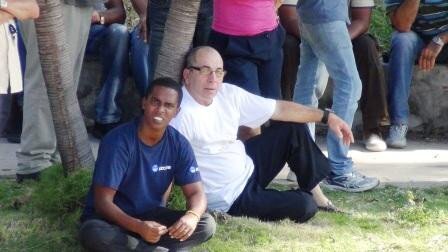
From www.cubanet.org.- Agents of the State Security (the political police) just kidnapped Antonio Rodiles, leader of the independent social-cultural group Estado de SATS, using extreme violence, according to what could be learned from the activist and journalist Camilo Ernesto Olivera. Rodiles stepped a few yards off his property to ask some schoolchildren to stop painting signs on the street against the attendees of the Human Rights Conference being held at house beginning yesterday.
There was an altercation with the police and State Security rapidly stepped in. As Rodiles was being detained his wife and his mother, Ailer Gonzalez and Gladys Fernandez respectively, protested and were surrounded by the government demonstrators, children and adults.
Then began a typical act of repudiation (insults and expletives) like those held in the early 80s against those leaving the country. At the time of this writing the two women remain under siege.
On the closing day of the First International Conference on Human Rights being held in Rodiles’ home, the house remained surrounded and the use of children as political mediators, with songs, music and government banners, continued. Camilo Ernesto Olivera underscored how unfortunate it is that the State gets involved in this situation to block the Conference.
The Washington Post carried an editorial in support of the Rodiles: Antonio Rodiles boldly confronts the Castro regime
11 December 2013
Estado de Sats Presents “Notebooks for the Transition” in the Midst of a Police Operation
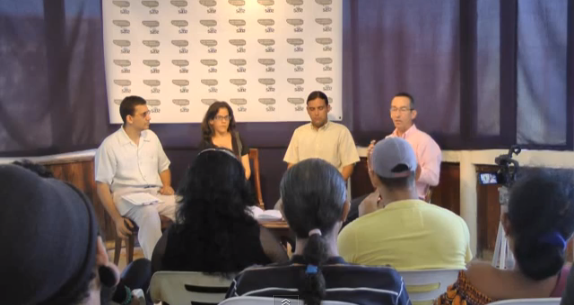 Saturday morning Estado de Sats presented the first issue of their magazine “Handbooks for the Transition” despite a political operation to prevent the audience from arriving; several activists were detained, Antonio Rodiles, director of the independent project, informed Diario de Cuba
Saturday morning Estado de Sats presented the first issue of their magazine “Handbooks for the Transition” despite a political operation to prevent the audience from arriving; several activists were detained, Antonio Rodiles, director of the independent project, informed Diario de Cuba
According to Rodiles, Gabriel Barrenechea, a member of the magazine’s editorial board, and Andrés Pérez were besieged in their homes. Meanwhile, the artist Luis Trápaga was arrested on his way to the presentation, as was José Díaz Silva, who was beaten and held at least six hours.
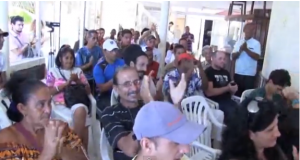 However, about 60 people managed to attend the event. Rodiles said that some participants were arrested by regime’s agents on leaving, to take copies of the magazine from them.
However, about 60 people managed to attend the event. Rodiles said that some participants were arrested by regime’s agents on leaving, to take copies of the magazine from them.
“Despite arrests, violations, pressures, we presented ‘Handbooks for the Transition.” SATS will continue because the desire for freedom us unstoppable,” insisted the director of the independent project.
The monthly magazine, in print and digital editions, “has as its objective to address different themes about the future transition to democracy on the Island, with authors from within and outside the country,” Rodiles told Diario de Cuba this week.
The first volume includes articles by Walfrido Lopez (The Internet in Cuba-US Relations), Emilio Morales (Remittances have become an engine of the Cuban economy), Juan Antonio Blanco (Civilizational and migration change), and Antonio Rodiles and Alexis Jardines (Notes for the transition), among others.
Future issues will address topics such as economic liberalization and legality.
“We must begin to discuss these issues openly. We need to debate them, without fear,” said Rodiles.
Diario de Cuba | 2 November 2013
“Notebooks for the transition,” A Magazine for Discussion / David Canela Pina
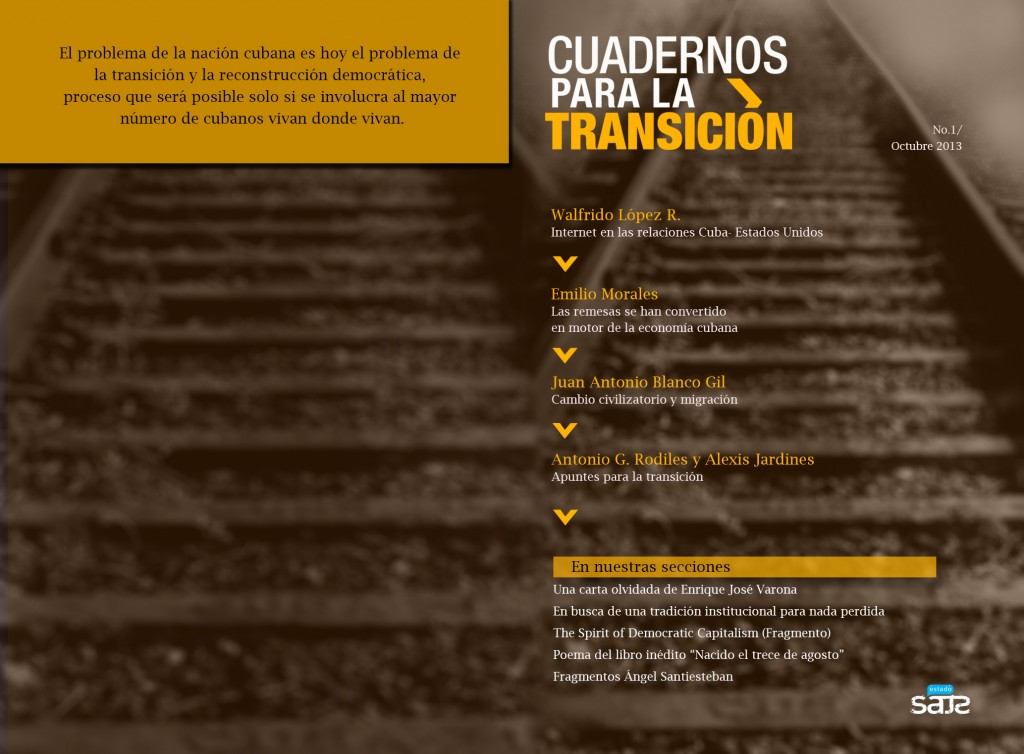 HAVANA, Cuba, November www.cubanet.org.- This Saturday morning the civic project Estado de SATS (State of SATS) presented a new magazine titled Notebooks for the Transition, which aims to “offer a forum for analysis and plural participation,” for all Cubans interested in “thinking and visualizing that other Cuba which is already urgent” according to an editorial note. It says that the first issue is “dedicated to the issue of transnationality.”
HAVANA, Cuba, November www.cubanet.org.- This Saturday morning the civic project Estado de SATS (State of SATS) presented a new magazine titled Notebooks for the Transition, which aims to “offer a forum for analysis and plural participation,” for all Cubans interested in “thinking and visualizing that other Cuba which is already urgent” according to an editorial note. It says that the first issue is “dedicated to the issue of transnationality.”
Notebooks for the Transition is a magazine produced and coordinated by the State of SATS civic project, which has had as one of its main strategies to become an ideological “bank,” where ideas and trust in this “human capital” that has been invested in other parts of the world due to the exodus of Cuban society can return. In this issue, for example, collaborators include intellectuals and artists who don’t live on the Island: Juan Antonio Blanco Gil, Emilio Morales, Alexis Jardines, Carmelo Mesa Lago, Garrincha, among others. Their presence is distant for now, but as the transition to democrat becomes more visible and effective, the process of return of many of these social actors will no longer be an event, but become a flow, that newly enriches the naitonal sap.
Presentation of Notebooks
Despite the police operation, that prevented some people from coming to the meeting site, leaving their homes, and even their provinces, as was the case of Jose Gabriel Barrenechea. More than forty people attended the launch of the first issue.

The panel that presented the details of the magazine was made up of Antonio Rodiles, overall project coordinator Estado de SATS, Ailer González, its artistic director, Camilo Ernesto Olivera, freelance journalist, and Walfrido Lopez, a computer specialist. The first three are part of the Editorial Board, along with José Gabriel Barrenechea and Alexis Jardines, who is the only member currently located outside of Cuba.
During the exhibition they addressed issues such as the integration of Cuban society, the economic and “knowledge” remittances, the leadership structures, civic maturity as a prerequisite for the conscious transition, the role of Cubans inside and outside Cuba in the new political system, etc.
Not just for regime opponents
Rodiles commented that “Cuban society is badly damaged and fragmented, so we need to bring together Cubans around a frank discussion.” And he said that in the transition to democracy “it must be not only activists and opponents, but also ordinary citizens.”
With regards to the role of the internet in building a democratic society Walfrido Lopez said that it is not enough for some Cubans to move freely on the internet, with their thousands of Twitter followers and hundreds of Facebook friends, but unable to create a network of internal communication with the Cubans on the Island.
In the current economic context, Rodiles said the “economic flow between Cuba and Miami is the centerpiece of a change in Cuba,” which is already funding private businesses, buying houses, etc. And he added that emigrant remittances provide the largest source of revenue to the national economy and today reach 62% of Cuban homes.
“The transition begins with us”
Camilo Ernesto Olivera raised the old problem of how to achieve this national unity of interest, at least within the opposition. Then he said that we must first move ourselves toward a civic consciousness and a maturity based on respect. “The transition begins with us,” he said. Rodiles, meanwhile, said that national unity should not revolve around a leader, a new Fidel Castro and called for a “polycentric opposition.” He said that “the relationship between individuals is what generates human and social capital,” and therefore “our magazine is aimed at creating those links among all Cubans.”.
With great wit, Ailer Gonzalez enunciated that “differences of opinion between the opposition do not strengthen the regime, rather they strengthen the opposition,” as they increase its capacity for public debate.
Rodiles stressed that “the influence of Cubans abroad is extremely important,” while Gonzalez addressed Cubans who live and struggle in their own country: “What is your role in the new Cuba? Being an opponent is not an occupation. Everyone should begin imagining the place they will occupy in the new Cuba.”
Finally, Ailer Gonzalez concluded the meeting with these words: “Thank you to all the Cubans in the world. We are waiting to rebuild Cuba.”
Summary of the first issue
Although Notebooks for the Transition has an essentially academic and research profile related to the present and possible future of Cuba, it has also opened spaces for literature, translation and history (with the section called Documents).
This issue, which corresponds to the month of October, is composed of several sections: Editorial, Survey, Dossier (the main section), Documents, Translation and Literature.
In the Survey, some people in Santa Clara respond on “the issue of Cuban emigration and its role within the nation.” The Dossier meet has five articles: “The Internet in Cuba-US Relations” by Walfrido Lopez; “Remittances have become an engine of the Cuban economy” by Morales; “Civilizing and Emigration Change” by Juan Antonio Blanco Gil; “The Dominican Republic: a transnational nation-state” written by a group of authors; and “Notes for the transition” by Antonio Rodiles and Alexis Jardines.
The Documents section rescues “a forgotten letter from Enrique José Varona” written in 1900; and in Translation is published an excerpt from the book The Spirit of Democratic Capitalism by Michael Novak. Finally, the Literature section reproduces the poem “Bottle” by Otilio Carvajal (included in his unpublished book Born August 13), and also the poem “Fragment” by Angel Santiesteban.
David Canela Piña
Cubanet, 4 November 2013
For Another Cuba — Not in Miami? — Watch Live
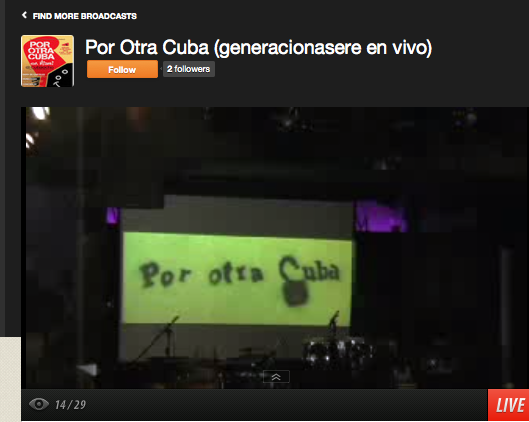 Click on the Image — or here — to Go to a Live Stream
Click on the Image — or here — to Go to a Live Stream
4 May 2013


